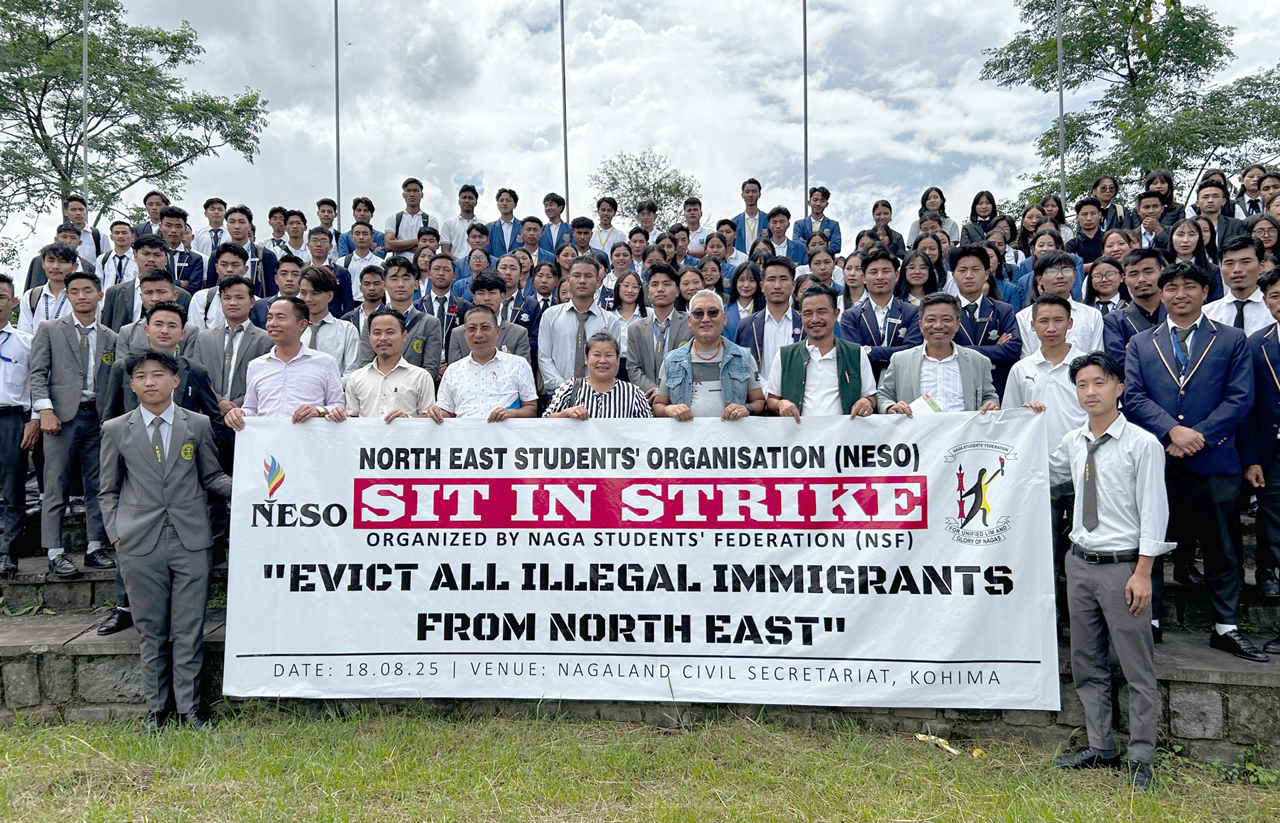The Naga Students’ Federation (NSF), under the banner of the North East Students’ Organization (NESO), staged a sit-in protest at Naga Solidarity Park, Kohima, on Monday under the theme “Evict all illegal immigrants from Northeast.” The protest was part of NESO’s coordinated campaign across the region to draw urgent attention to what it termed as an existential threat posed by the unchecked influx of illegal immigrants.
Addressing the gathering, NESO State Coordinator and Chairman of the programme, Ejanthung Ngullie, highlighted the historical importance of the Inner Line Permit (ILP) system, introduced under the Bengal Eastern Frontier Regulation (BEFR) of 1873. He reminded that the issue has been a long-standing concern for NSF, which had even set up the Inner Line Regulation Commission decades ago to pursue the matter.
Ngullie explained that the ILP was designed to regulate entry into the Northeast to protect indigenous communities, safeguard their culture and heritage, and maintain demographic stability. However, he lamented that ILP is enforced in only four Northeastern states, which has “drastically affected socio-economic and cultural structures.” He urged both the State and Central governments to take the ongoing NESO protests seriously and act decisively.
Stating that the Government of the day needs to ponder upon this situation, Ngullie urged the Central Government to take the ongoing NESO protests seriously and act decisively.
Reading out NESO’s charter of demands addressed to the State and Union governments, Ngullie emphasized on the implementation of strict measures for immediate eviction and deportation of illegal immigrants. The second demand was to seal the Indo Bangladesh border, third demand was to strengthen border control and monitor vulnerable areas by deploying security personnel and modern surveillance technology; fourth demand was to coordinate with neighboring states while implementing the policies of ILP to ensure that migrants are not just relocated but totally pushed out from Northeast.
He said the fifth demand stands to preserve and protect indigenous rights, culture, language, political and ownership rights through legal and policy measures of the Government.
Seeking the attention of the state government, Ngullie said that the sixth demand is to set up a special review committee on the population explosion.

NSF President Medovi Rhi questioned the seriousness with which ILP is being implemented, noting that the Federation has been fighting for this cause since 1980. He called upon students to remain vigilant and proactive, reminding them that the future of Nagaland lies in their hands.
In his keynote address, NESO Secretary General, Mutsikhoyo Yhobu warned that the demographic threat posed by illegal immigration not only affects today’s generation but future generation. He pointed out that demographic shift is evident in states like Tripure, where indigenous people have become a minority in their own ancestral homeland and cautioned that similar patterns are unfolding in Assam and other Northeastern states.
Yhobu also stressed the need to restore ILP to its original form as a “pass” system rather than a “permit,” differentiating between regulating temporary visitors and addressing the challenge of illegal immigrants.
Download Nagaland Tribune app on Google Play

The programme concluded with the submission of a memorandum to the Chief Minister of Nagaland by NESO. The memorandum described the issue as not merely a political or administrative issue but a matter of “survival for the indigenous communities of the Northeast,” further mentioning that “Our languages, our traditions, our cultural practices, and our very existence as distinct peoples are at stake.”
It urged the Government of India and state governments to act to treat this issue with seriousness and urgency, stating: “The demographic and cultural changes already visible in parts of our region are warnings of an existential crisis. If strong and sustained measures are not taken now, the very identity of the Northeast’s indigenous peoples could be irreversibly altered.”
The NESO hoped that the office of Chief Minister would act with vision and determination to address this grave matter.
The protest began with a prayer by Esther Rhakho, former NSF general secretary and concluded with a word of gratitude by NSF Information & Publicity Secretary Pithungo Shitio.

